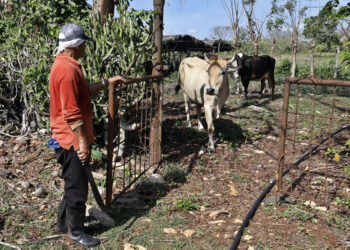The practice of euthanasia as a technique to ensure a dignified death will not be included in the new Public Health Law, as emerged in a debate on the draft of the law carried out among the sector’s professionals in Cuba.
According to a report of the exchange published by the Cubadebate website, everything related to this method would be addressed “at a later time” and would be legislated “when the conditions are created for it.”
https://twitter.com/MINSAPCuba/status/1720929075416441227?ref_src=twsrc%5Etfw%7Ctwcamp%5Etweetembed%7Ctwterm%5E1720929075416441227%7Ctwgr%5Efefe07b2dac6d84024f40fc5c18ccb32c0953135%7Ctwcon%5Es1_&ref_url=https%3A%2F%2Foncubanews.1eye.us%2Fcuba%2Fnueva-ley-de-salud-publica-no-incluira-la-practica-de-la-eutanasia%2F
The first version of the draft, presented last December to the deputies of the National Assembly of People’s Power (ANPP), included this possibility, but then Cuban Minister of Public Health Dr. José Ángel Portal Miranda pointed out that for its implementation a higher-ranking legal provision was required
Commenting on the change in perspective, Dagmara Cejas Bernet, legal director of the Ministry of Public Health (MINSAP), explained that the bill tasks the ministry with advising authorities to define “when would be the optimal and appropriate time to address life-ending techniques.”
She added that guidelines for these techniques will be established in the future, “considering legal, health and ethical regulations, as well as a health context, trained health personnel and established protocols.”
She also announced that at that time the postulates that would support the evaluation of a request of this type will be recognized, which in addition to the person’s request, will require a mechanism to ensure that they have the necessary foundations to access this situation.
José Luis Toledo Santander, president of the Constitutional and Legal Affairs Commission of the ANPP, stressed the importance of this debate exercise on the bill, since “there is a valuable set of knowledge and experiences that can be very useful to improve the proposal.”
The media highlighted that a dignified death is an inalienable right recognized in Article 40 of the Constitution of the Republic of Cuba endorsed in 2019, which establishes that human dignity is a supreme value that must be preserved at all times, even after death.
According to the jurist, this concept has undergone transformations since its inception, initially focusing on the recognition of the right to ignorance. It was later realized that it was limited and was expanded to include other situations related to end-of-life care.
In the opinion of Cejas Bernet, the proposal under discussion seeks first of all to recognize the right to a dignified death.
Furthermore, “the different health situations are addressed and the responses that the system must provide in each case are established, avoiding, for example, therapeutic cruelty…the bill focuses on the organization of end-of-life care,” she said.
Some novelties
Although the regulatory proposal ratifies the constitutionally endorsed universal and free access to people’s health services, it recognizes new rights, services and updates the principles of organization and operation of the island’s National Health System.
During the debate on the bill, sector specialists highlighted the importance of updating Law 41 since 1983 to guarantee constitutional compliance, Cubadebate noted.
According to the media, the proposal incorporates more than 40 articles focused fundamentally on non-discrimination in health services, the recognition of human dignity as a supreme value and the responsibilities of the State in the provision of care, protection and recovery services, “a concept that is incorporated for the first time.”
It also specifies that its articles integrate relevant aspects of the recently approved Family Code, such as solidarity pregnancy and recognition of the best interests of children and teenagers.
“The regulations ratify the people’s right to free health care and establish the rights and duties of people, as well as obligations for users of health services,” said Cejas Bernet.
Ya está disponible el anteproyecto de la nueva Ley de Salud Pública en #Cuba. Es una propuesta legislativa necesaria que ratifica el acceso universal y gratuito a los servicios de salud, un derecho fundamental para todas las personas. #CubaPorLaVidahttps://t.co/1joBMcHkvm pic.twitter.com/8JkyXQHc1w
— José Angel Portal Miranda (@japortalmiranda) November 4, 2023
At the same time, she stressed that the bill “is in line with other laws already in force in the country such as the Personal Data Protection Law, which has an impact on the health sector due to its responsibility in the collection, use, and custody of that information related to the health status of people.”
Cejas Bernet illustrated the importance that the law gives to aspects such as ethics and values. “Although Law 41 made reference to these aspects, it was not sufficient given its importance for the system. Ethics and values are mandatory subjects in the study program and are fundamental in the practice and exercise of the medical profession,” she said.
The jurist commented that for the first time, the three levels of care are recognized in the national health system and issues related to the free services, limits, and non-free nature of some services are addressed.
In this last aspect, reference is made to services considered elective aesthetics and that do not respond to medical indications, illnesses, their consequences or accidents.
She pointed out as a novelty that the obligation for health services to be provided with quality is recognized. “In law 41 of the Constitution, it was established that health services were free, but the need to provide them with quality was not specified. Therefore, the working group considered it important to address this issue specifically, as it is of great importance and strategic,” she noted.
She also highlighted the place that aspects such as informed consent occupy within the document, because “although the previous regulations recognize the need to obtain authorization to carry out a procedure, after 40 years of the services and technical advances in health in general, as well as social development, it is necessary to do a good exercise in this regard,” she considered.










